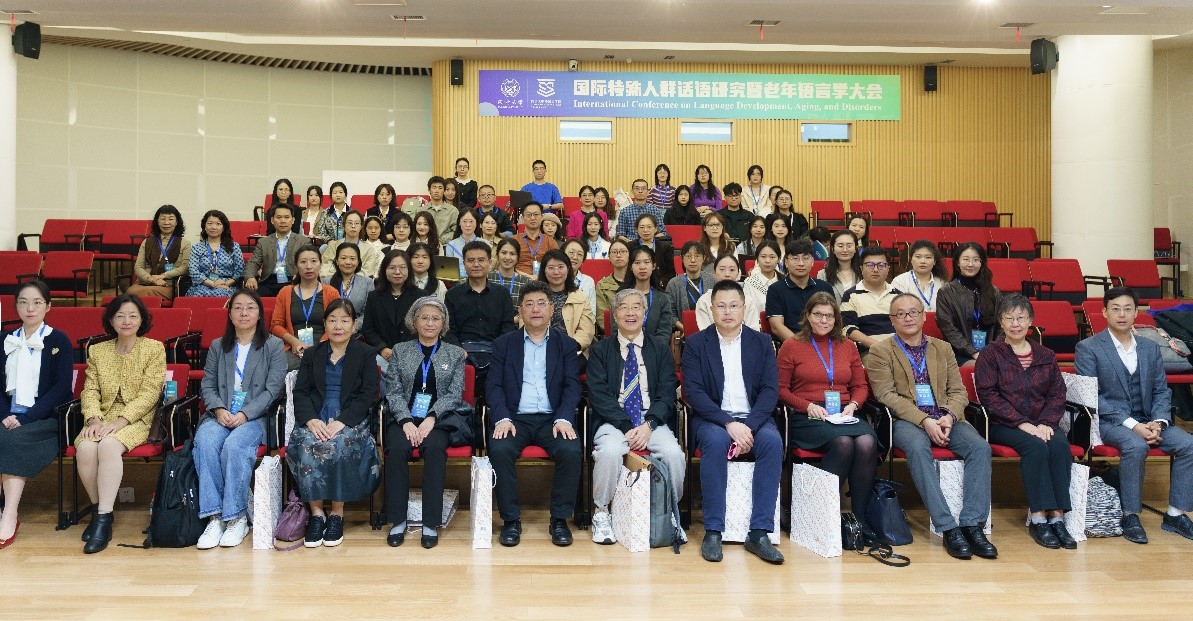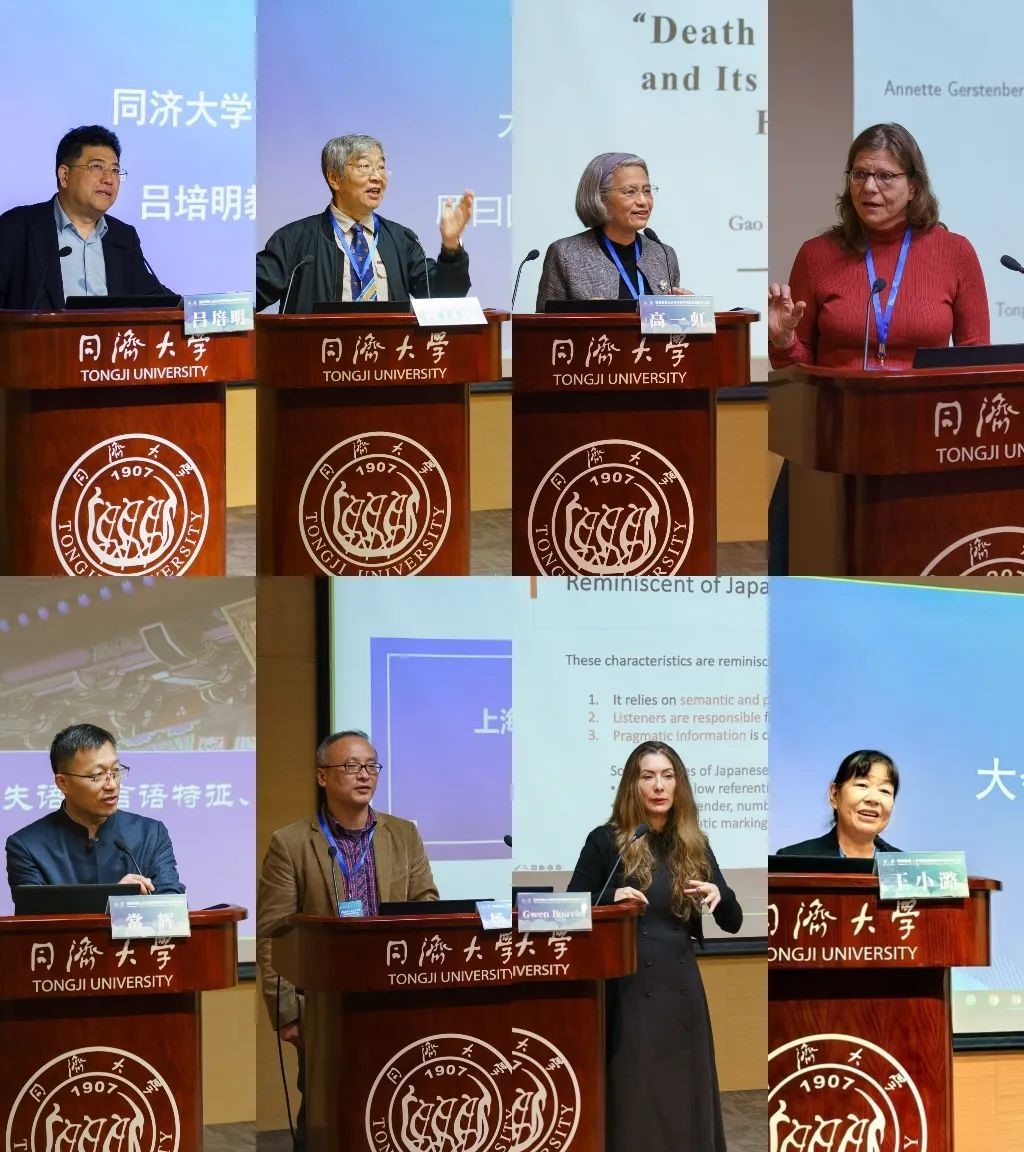The International Conference on Language Development, Aging, and Disorders, organized by the Research Center for Aging, Language and Care of Tongji University, was held at the Siping Campus from October 25 to 27. The event brought together experts from leading global institutions, including Stanford University (USA), University of Potsdam (Germany), University of Warwick (UK), University of Lisbon (Portugal), National University of Singapore. Scholars and students from Chinese universities including Peking University, Shanghai Jiao Tong University, Shandong University, Renmin University of China, Hong Kong Polytechnic University and Tongji University, also participated in the hybrid way. The discussions covered topics such as children’s language development and disorders, adult language behavior and health, and language deterioration and decline of the older adults, highlighting the cutting-edge interdisciplinary trends in linguistics, medicine, cognitive science, sociology, psychology, and gerontology.

Professor LYU Peiming, Executive Vice President of Tongji University, delivered the opening speech. He emphasized Tongji’s longstanding tradition in foreign language studies, dating back to its German language courses in 1907. Today, the university’s language and literature programs focus more on interdisciplinary innovation and frontier research. The university has established several influential interdisciplinary innovation teams, with the main target of resolving major theoretical and practical problems. It has created a distinctive “Tongji brand” through efforts fostering the integration of disciplines, convergence of science and education, and cooperation between academia and industry. Professor Li Qinghua, Chair of the Medical Language and Translation Research Committee of the China Association for Comparative Studies of English and Chinese, offered congratulations on the conference’s successful launch. Professor Gu Yueguo, chair of the conference, delivered a welcome address. Professor Shen Qi, Vice Dean of the School of Foreign Studies at Tongji University, expressed gratitude for the support of attendees. Professor Wang Xiaolu from Hangzhou City University provided a conference review, while Professor Huang Lihe, Deputy Director of the Office of Humanities and Social Sciences at Tongji University, served as the moderator.
Renowned experts delivered presentations on a range of specialized topics. These included Professor Gu Yueguo from Beijing Foreign Studies University on assessing older adults’ language, Professor Gao Yihong from Peking University on death discourse literacy and its practice, Professor Annette Gerstenberg from the University of Potsdam on lifespan pragmatics, Professor Yoshiko Matsumoto from Stanford University on the linguistic behavior of persons living with dementia. Other key topics presented by Professor Boyd Davis from the University of North Carolina at Charlotte, Professor Louise Cummings from the Hong Kong Polytechnic University, Professor Gwen Bouvier from Shanghai International Studies University, Professor Chang Hui from Shanghai Jiao Tong University, Professor Ma Wen from Shandong University, and Professor Yang Xiaohu from Tongji University covered areas like dementia care communication, the diagnosis of dementia and its pragmatics markers, health discourse and women’s health, aphasia speech characteristics and rehabilitation training, echolalia in children with autism, and the perception of Mandarin tones among elderly people in Shanghai. These sessions showcased the latest theoretical and practical insights, highlighting both academic advancements and real-world applications.

The conference also hosted specialized sub-forums led by notable academics such as Professors Zhang Qingfang from Renmin University of China, Wang Huili from Hangzhou City University, He Wenguang from Qufu Normal University, Professor Chang Xin, Associate Professor Dong Jing from Tongji University, Dr. Zhang Wei from City University of Hong Kong, and Dr. Zhou Deyu from East China University of Science and Technology, which explored phonetic, lexical, syntactic, and pragmatic studies in special populations. The discussions ranged from descriptive studies of linguistic characteristics, theoretical model hypotheses, and explanatory studies on neurocognitive mechanisms to applied studies like language cognitive training methods for children and AI-based linguistic markers for elderly cognitive impairment.
The conference was convened in the context of global aging and the growing importance of research on language development across the human lifespan. It underscored the critical need for theoretical frameworks and the practical resolution of challenges related to language development, aging, and disorders.
The Research Center for Aging, Language and Care at Tongji University was created to address the important issues of language aging and cognitive preservation in the context of global aging, with a particular focus on China’s aging population and the frontiers in aging studies. The Center is among the first independent institutions of its kind in China to adopt multimodal approaches and conduct academic research, personnel training and social services in the field of language aging, cognitive decline, and gerontology.
